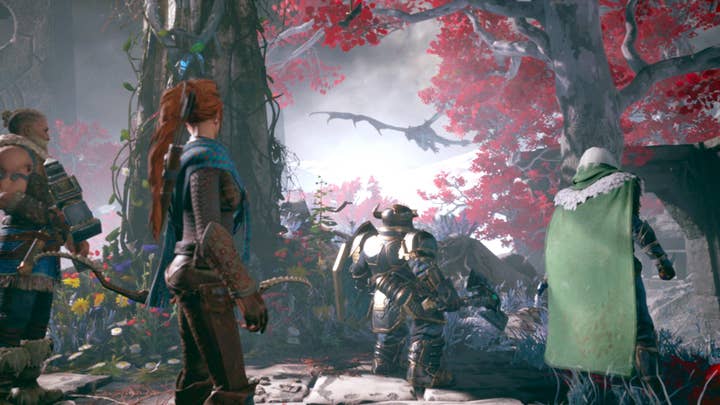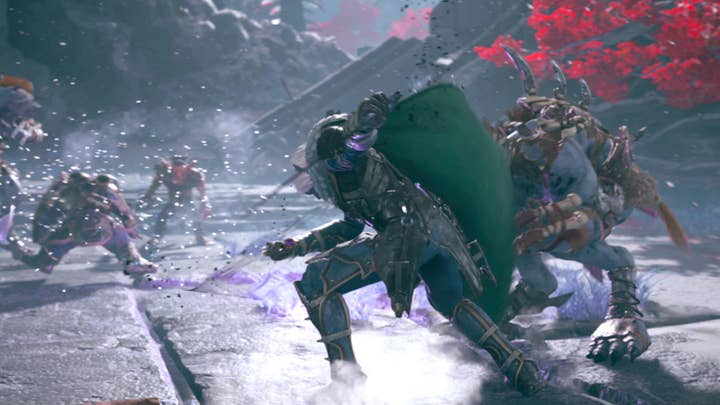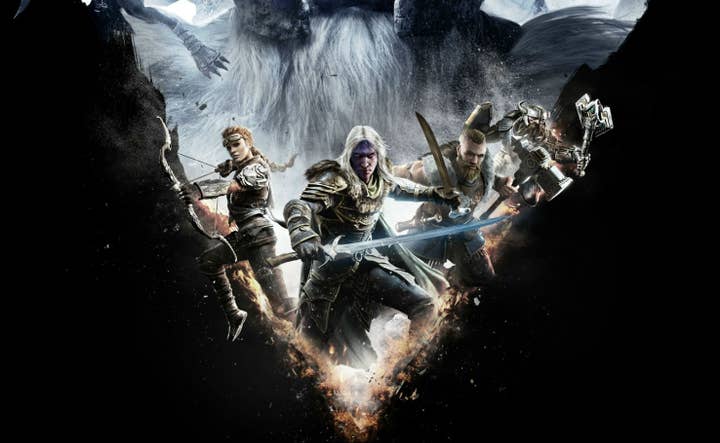Expect "seven or eight" Dungeons & Dragons games in the near future
Wizards of the Coast president Chris Cocks reveals that D&D is returning to video games in a big way
Last night at the Video Game Awards, Dungeons & Dragons publisher Wizards of the Coast revealed its latest video game project: Dark Alliance.
After having been largely absent from the games industry over the last ten years, Dungeons & Dragons (D&D) is returning to stake its claim. Earlier this year, it was revealed that Larian Studios is developing Baldur's Gate 3, a decision which Wizards of the Coast president Chris Cocks tells GamesIndustry.biz was "one of the easiest first decisions."
Developed by Tuque Games, which was acquired by Wizards of the Coast in October this year, Dark Alliance sits in the mid-sized project category. One of the "seven or eight" games Wizards has lined up over the next few years, Cocks is reluctant to brand the game as AA or AAA, saying its "all in the eye of the beholder."
Cocks started playing pen and paper games in the '80s, before being introduced to the Gold Box games for Dungeons & Dragons. For Cocks, like millions of others, D&D was a gateway into fantasy.
Dungeons & Dragons has come a long way since it first arrived in 1974. Back in those days, female characters automatically had a penalty to their strength stat, and the art had a distinctive "hastily drawn on a wet napkin" vibe.
"We really don't limit people. The D&D team's job is to say 'yes'"
Despite being an obtuse system, which pitched dungeon masters against the players in a gruelling slog through instant-death dungeons, the first edition of D&D was a hit. These days Dungeons & Dragons is a more inclusive, co-operative affair, that sees dungeon masters facilitating players rather than trying to beat them. At its heart, Dungeons & Dragons is a collaborative storytelling experience, with chunky combat and lots of opportunities to be very, very silly.
Much of the appeal of games like Dungeons & Dragons is the freedom. If you can dream it, you can do it. Well, you can at least try; and if the dice gods are generous (and your plan follows some basic logic) you might even succeed. Compared to Dungeons & Dragons, modern video games are notably rigid. Even open-world experiences that promise freedom and choice cannot compare to the boundless capacity of a dungeon master.
Dungeons & Dragons began life as more of a war game than an RPG, and those origins can still be seen today in the latest edition (5e), which is built upon a rigorously designed combat system that manages to be both tactically deep and accessible. Through a combination of strange monsters and an extensive range of character capabilities, combat in Dungeons & Dragons is brutal, horrifying and hilarious in equal measures. This is where Wizards of the Coast and Tuque Games have focused their attention with the new Dark Alliance project.

Given the impossibility of truly replicating a tabletop RPG in a video game, Cocks says the options of limited when it comes to a feasible approach.
"We want each game to have a point of view, and to really keep on just a couple of things and do it really, really well," he tells us. "What you don't want to do is have every game in the franchise try to do the same thing, and try to do everything all at once."
Cocks compares Wizards' licensing approach to how a good dungeon master runs the game; it's all about facilitating.
"We really don't limit people," he says. "The D&D team's job is to say 'yes' when people want to play something... The best dungeon masters tend to want to figure out how to say 'yes', and have the players do what they want to do... We want to open it up, open up the narrative possibilities, the character development, open up the level of problem solving and combat opportunities and thrills that players can be able to experience.
"In future games we will explore different areas, whether it's grand strategy and combat at army level scale, to really intimate character portrayal"
"And we're going to do it in a variety of genres... And in future games we will explore different areas, whether it's grand strategy and combat at army level scale, to really intimate character portrayal."
Dungeons & Dragons has enjoyed a renaissance in recent years. Following on from the much maligned fourth edition (4e) -- which returned to the franchise's wargaming-heavy roots -- 5e arrived in 2014 as video livestreaming was enjoying a meteoric rise. While this is an important factor in the game's resurgence, Cocks suggests there is more to it.
"It's not just a game that you experience yourself, it's a game that you form friendships with, around the table -- or today around the screen," he says. "I think people had a longing for that experience, and because we made such a nice, open-ended experience with [5e], you couple that with the rise of sharing platforms that are inherently cooperative and inherently social, and you have this nice synergy where the two fed upon each other.
"As we develop our video games, we're trying to leverage that as well. We will have single player games; we think they're important. There will be single player modes in all of our games, but we always think that our co-operative perspective, that forming a party with your friends and doing great things together -- the party is bigger than individual components -- will always be an important part of our secret sauce."

Although considered the original role-playing game, Dungeons & Dragons has been notably absent from the video game space over the past decade. The franchise enjoyed considerable success with titles like Icewind Dale, Neverwinter Nights, and Baldur's Gate in the late '90s and early '00s. But Wizards' only offering in recent years has been the Neverwinter MMO, which continues to fly largely under the radar, despite the staggering popularity of the Dungeons & Dragons brand.
With this considered, it raises the question of what Dungeons & Dragons can really bring to the video game sector, that isn't already catered for elsewhere. The fantasy genre is well-populated with titles like The Witcher, Divinity: Original Sin, Pillars of Eternity, and The Elder Scrolls. Additionally, considering the impossibility of translating the D&D experience wholesale into a video game, has the industry simply moved on?
According to Cocks, beyond the simple power of brand recognition, Dungeons & Dragons has extensive lore it can mine, much of which has come from best-selling books. This is evidenced by the company's decision to lead off its re-entry to the video game scene with a third installment of the popular Baldur's Gate series.
Dark Alliance meanwhile will be leaning on the popularity of Drizzt and the Companions, from the 25-book series by R. A. Salvatore, which Cocks describes as "the Avengers of D&D."
"We have a tonne of lore," says Cocks. "I would argue there are very few, if any fantasy properties with the amount of lore to mine, like we have with Dungeons & Dragons... Literally thousands of books, hundreds of which are bestsellers... So there is a lot you have to build upon. And then I think you have one of the best character and adventure engines in the business, with 5e, which really I think really opens the aperture on character developments... I think it opens up creative possibilities for creators."









